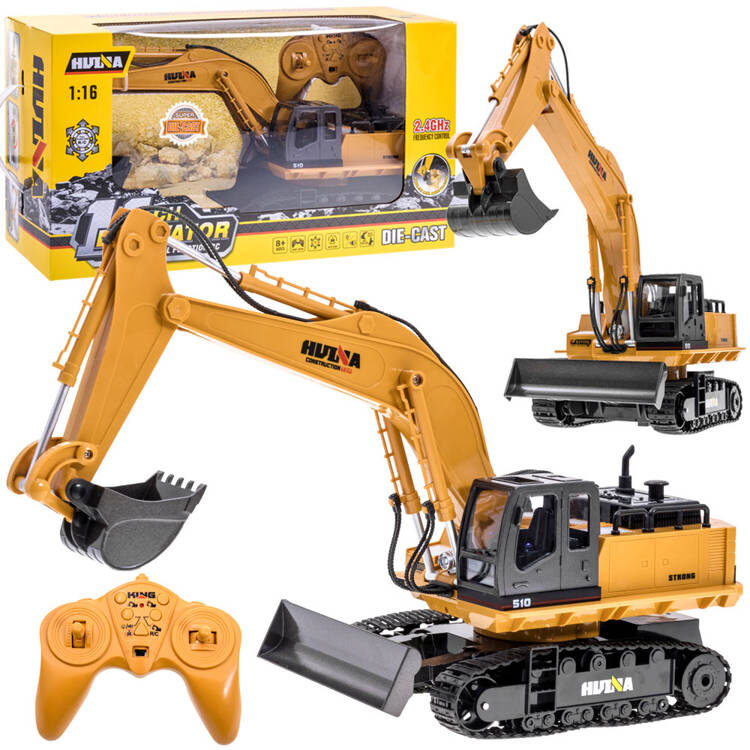Comprehending Exactly How Excavator Functions and Its Influence On Performance
Excavators play a vital function in building and mining procedures, relying upon a complicated interaction of mechanical and hydraulic systems. Their capability to perform a range of tasks hinges on both their design and the technology integrated within. Understanding these components can greatly affect operational efficiency and performance. As improvements continue to reshape the industry, one need to consider just how these adjustments will certainly influence future techniques and efficiency.
The Basics of Excavator Mechanics

The Role of Hydraulic Solutions in Excavators
At the heart of excavator procedure lies the hydraulic system, which plays a critical duty in powering the equipment's activities and functions. This system utilizes pressurized hydraulic liquid to move power, making it possible for various actions such as digging, training, and moving. By taking advantage of the principles of hydraulics, excavators can execute jobs with exceptional precision and force, improving general operational efficiency.The hydraulic system contains essential elements, including pumps, shutoffs, and cyndrical tubes, which interact to control the flow and instructions of the liquid. When the driver involves the controls, the hydraulic fluid is routed to details cylinders, equating the operator's commands into physical activity. This mechanism enables receptive and smooth actions, which are important in construction and excavation environments. double e volvo rc excavator. The effectiveness of the hydraulic system directly affects the efficiency and versatility of the excavator, making it an important component in modern excavation procedures
Trick Elements of an Excavator
Comprehending the crucial elements of an excavator is vital for understanding how this effective machine operates. An excavator contains numerous considerable aspects, consisting of the undercarriage, residence, boom, arm, and bucket. The undercarriage gives stability and movement, frequently featuring wheels or tracks to navigate different terrains. Your home contains the engine and hydraulic systems, permitting the operator to manage movement and power the machine. The boom prolongs from the residence, allowing vertical reach, while the arm attaches to the pail, promoting digging and training operations.Additionally, the taxi houses the driver, geared up with controls for specific maneuvering. Each of these components plays a crucial function in the excavator's total functionality, adding to its performance and efficiency on building and construction websites. Recognizing these components assists in optimizing and maintaining excavator performance, making sure tasks are finished safely and efficiently.
Attachment Flexibility and Its Benefits
Attachment flexibility is an essential element of excavators, enabling drivers to change in between different tools tailored for specific jobs. This flexibility not only boosts job effectiveness but likewise adds to cost-effectiveness by decreasing the requirement for multiple equipments. Understanding the various types of attachments readily available can considerably impact the general performance and capability of an excavator on task sites.
Types of Add-ons
While excavators are largely acknowledged for their excavating capabilities, their real flexibility exists in the vast array of accessories offered. These accessories enhance the excavator's capability, permitting it to perform different tasks beyond excavation. Typical accessories consist of containers (for excavating and scooping), hydraulic thumbs (for comprehending products), and augers (for drilling openings) Grapples are made use of for handling and relocating debris, while rippers can separate difficult surfaces. Various other specialized add-ons, such as plates and plows, make it possible for excavators to adapt to specific job requirements. This variety not just increases the equipment's energy across various fields, including building, landscaping, and demolition, however additionally allows drivers to tailor their equipment to satisfy particular project demands successfully.
Raised Job Efficiency
Taking full advantage of job performance is a primary benefit of utilizing various excavator attachments. Various add-ons enable an excavator to carry out several jobs without requiring to switch devices, conserving important time and labor. As an example, utilizing a hydraulic hammer can break concrete while a bucket attachment can dig deep into soil, allowing a smooth operations. This flexibility lowers downtime linked with tools modifications and boosts performance on-site. In addition, specialized accessories boost precision in tasks such as grading or landscape design, leading to better outcomes. The capability to adapt to different task needs not only streamlines procedures yet also decreases the demand for additional equipment, making certain that jobs are finished quickly and efficiently. Generally, attachment adaptability significantly adds to raised task efficiency in excavation job.
Cost-Effectiveness and Adaptability
Cost-effectiveness is a considerable benefit of making use of flexible excavator accessories. These attachments allow a solitary excavator to do several tasks, minimizing the demand for extra equipment and labor - double e volvo rc excavator. By switching between buckets, hammers, and grapples, operators can deal with various jobs, from digging to demolition, therefore optimizing equipment usage. This flexibility not only reduces operational costs yet also lessens downtime related to altering devices. Furthermore, the ability to tailor excavators with specialized add-ons enhances productivity, as they can efficiently deal with varied jobs according to job demands. In conclusion, the mix of cost-effectiveness and flexibility in excavator accessories adds to boosted operational effectiveness and source allocation in construction and excavation tasks

Advanced Innovation in Modern Excavators
Modern excavators are progressively furnished with innovative modern technology that changes excavation procedures. Automation improves procedures, while boosted fuel efficiency minimizes functional expenses. Additionally, clever control systems boost precision and security, marking a considerable advancement in excavation devices.
Automation in Excavation Processes
As excavation innovation advances, automation has arised as a crucial component in enhancing effectiveness and precision on job websites. Modern excavators are equipped with advanced automated systems that assist in jobs such as grading, excavating, and trenching with very little driver intervention. These systems use sensing units, GPS, and device knowing formulas to guarantee accurate positioning and deepness control, considerably minimizing the margin for error. Additionally, automation enables operators to concentrate on strategic decision-making as opposed to hands-on controls, resulting in boosted performance on the whole. Such developments not only streamline workflows yet also improve safety by lessening human mistake in complex procedures. The integration of automation in excavation processes represents a considerable improvement in building and construction modern technology, driving the market towards greater performance and effectiveness.
Boosted Gas Efficiency
Improvements in innovation have actually additionally caused considerable renovations in fuel performance for modern excavators. Modern machines are equipped with sophisticated engines that optimize power output while reducing fuel usage. These engines utilize ingenious burning innovations, such as turbocharging and straight gas injection, to enhance performance and efficiency. In addition, light-weight materials in building minimize general weight, enabling less power expenditure throughout procedure. The intro of variable rate controls makes it possible for operators to adjust engine performance according to specific jobs, even more decreasing gas use. Therefore, these improvements not just lower functional costs however likewise add to ecological sustainability by top article reducing emissions. Overall, enhanced gas effectiveness in excavators is an essential advancement that reinforces productivity and economic practicality in the construction industry.
Smart Control Systems
While drivers navigate significantly intricate task sites, clever control systems in excavators have emerged as necessary tools for boosting efficiency and precision. These innovative modern technologies utilize algorithms and sensors to monitor numerous specifications such as lots weight, terrain conditions, and functional performance. By automatically readjusting hydraulic features, smart systems enhance device performance, resulting in enhanced productivity and decreased wear on elements. Additionally, drivers profit from instinctive interfaces that supply blog real-time responses and diagnostics, enabling informed decision-making. This combination of innovation not only enhances procedures but also minimizes human error, adding to safer workplace. As the construction sector remains to develop, wise control systems will play a crucial function fit the future of excavator efficiency and efficiency.
Enhancing Functional Performance With Excavators
Excavators play a necessary duty in improving functional effectiveness throughout numerous building and excavation tasks. Their adaptability permits for numerous jobs, including material, lifting, and digging handling, which enhances operations and minimizes the requirement for added devices. With effective hydraulic systems, excavators can execute durable jobs with precision, significantly reducing the moment called for to total projects. The integration of advanced technology, such as GPS and automated controls, further maximizes their operation, making it possible for drivers to achieve greater precision and reduce product waste. Furthermore, contemporary excavators are created to eat much less gas and lessen emissions, adding to both price financial savings and environmental sustainability. By using excavators effectively, building and construction groups can boost performance, meet task due dates, and improve general site monitoring. This multifunctionality and efficiency make excavators crucial devices in the modern-day construction landscape.
The Future of Excavators in Construction and Mining Industries
As the building and mining industries progress, the future of excavators is positioned for substantial improvement driven by technical development and altering operational demands. Developments in automation and expert system are reshaping excavator abilities, enabling improved accuracy and effectiveness in procedures. Independent excavators are emerging, reducing the demand for human intervention and lessening the risk of accidents.Moreover, the integration of telematics and IoT technology enables real-time monitoring of equipment efficiency and anticipating maintenance, optimizing uptime. Green styles, including electrical and hybrid designs, are acquiring grip, aligning with sustainability goals within the industry.Additionally, using sophisticated materials and lighter layouts boosts gas efficiency while maintaining efficiency standards. As these patterns progress, excavators will certainly play a vital role in satisfying the increasing demands for efficiency and security in construction and mining, inevitably changing operational landscapes.
Often Asked Concerns
Exactly How Do Weather Affect Excavator Efficiency?

Weather significantly affect excavator performance, as rain and mud can prevent traction and stability, while extreme temperatures might impact hydraulic systems. Operators has to adjust to these variables to guarantee excellent functionality and safety and security throughout operations.
What Safety And Security Actions Should Operators Adhere To While Making Use Of Excavators?
Precaution for excavator operators consist of putting on ideal personal safety tools, carrying out pre-operation inspections, ensuring proper interaction with ground employees, keeping a safe range from above threats, and adhering to well-known functional methods to protect against mishaps.
How Typically Should Excavators Be Kept for Optimum Performance?
Excavators must be kept frequently to assure peak efficiency, normally every 250 operating hours or as defined by the supplier. Routine checks boost reliability, prevent unanticipated malfunctions, and prolong the lifespan of the equipment.
What Is the Average Life-span of an Excavator?
The average lifespan of an excavator commonly ranges from 10,000 to 15,000 hours of procedure. Aspects affecting long life consist of maintenance practices, running problems, and the quality of the machine itself, affecting overall performance and efficiency.

Can Excavators Operate Irregular Terrain Efficiently?
Excavators can run properly on browse around here irregular surface due to their articulated designs and adjustable tracks. These features allow them to keep stability and grip, allowing efficient operation in tough environments commonly experienced in building and construction and landscape design jobs. Each of these parts plays a vital duty in the excavator's overall capability, adding to its performance and efficiency on building sites. Taking full advantage of task performance is a main advantage of making use of numerous excavator add-ons. While operators browse progressively intricate work websites, smart control systems in excavators have actually emerged as essential devices for enhancing efficiency and precision. Excavators play a necessary duty in boosting operational effectiveness throughout different construction and excavation jobs. Developments in automation and artificial knowledge are reshaping excavator capabilities, enabling for boosted accuracy and effectiveness in operations.
Comments on “The Best Practices for Operating a rc excavator in Small Spaces”